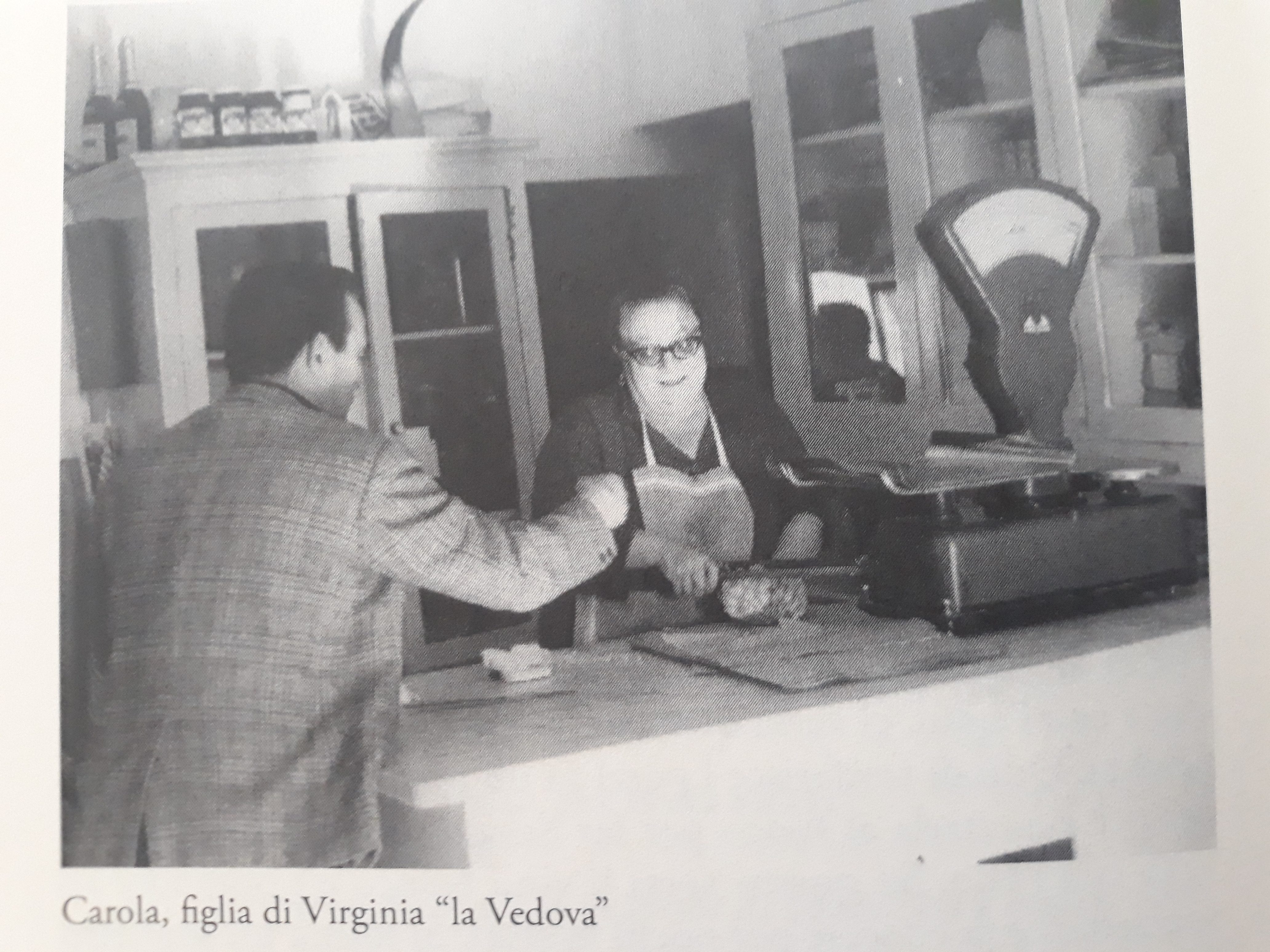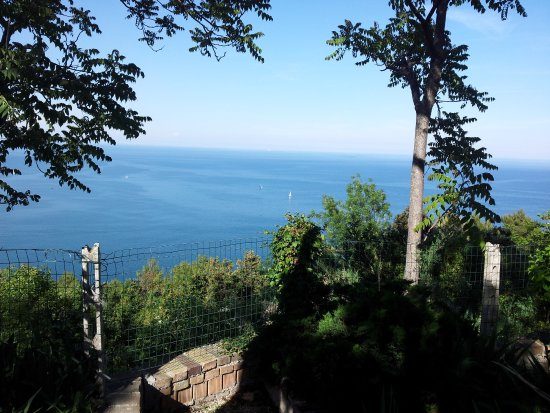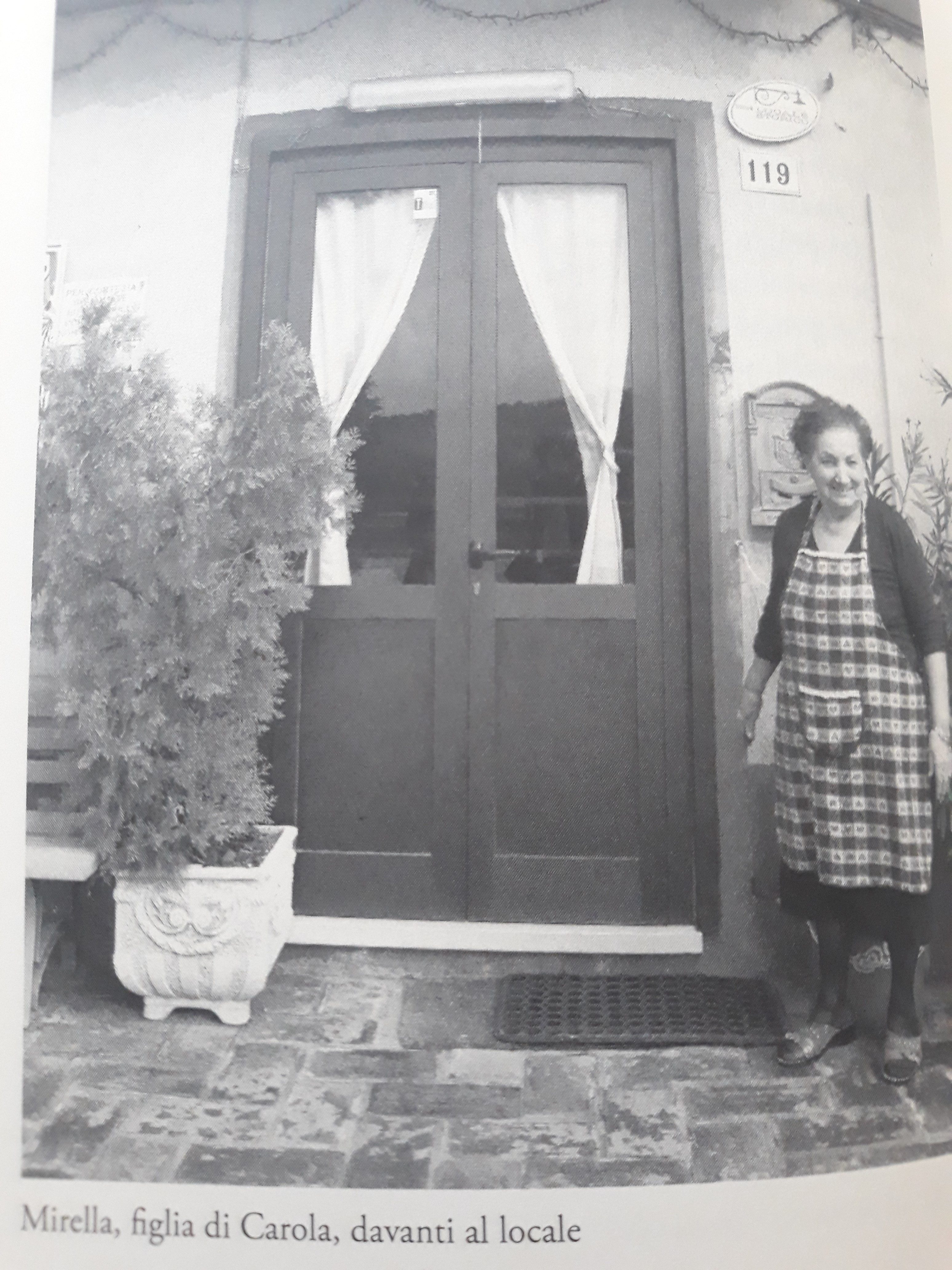On the road to go from the city of Ancona to the Bay of Portonovo you come across a clearing on the left before the curve of Monte dei Corvi, from which you discover an enchanting panorama of the gulf. There stands a low building which on one side overlooks the road and on the other remains at the top of the hill overlooking the sea. Whoever passes by sees two entrances: one with the raffia curtain, that of the tobacco shop and the wine shop with long tables and benches and the small food shop, and the other of the room where meals are consumed, this too furnished with tables.
Her name is the Widow. This is an ancient tavern. In 2012 it was declared a "historic place" by the Marche Region and a plaque hanging on the external wall testifies to this. A tavern that originates from a misfortune, or rather from the courage of a woman in facing bad luck. Virginia Fabretti, a young mother of two children and expecting her third, lost her railwayman husband who died in a work accident. To support her family, she invented a profession by making use of what she did best: cooking. So it was that in 1912 with the money from her late husband's settlement she opened the place and became a landlady. The first tavern was built not far from the current one. Virginia worked hard and as soon as she was able to do so she bought the land and built a small house with space for an inn, the same one you can frequent today. The renovations respected the original appearance, limited themselves to updating its functionality and did not distort its aesthetics. From the first years the customers were the farmers of the surrounding area and those who came on foot from the nearby hamlets, but there was no shortage of gentlemen who arrived in carriages. Subsequently, the clientele continued to increase with the proliferation of motor vehicles and the construction of the new road.
 In over 100 years the place has always been kept alive by women: after the widow Virginia, her daughter Carola, then Carola's daughters, Virginia and Mirella. The men of the family only acted as support, but the management was always held by the female part of the family. Virginia's granddaughter prepared many and many sandwiches destined for many and many radiant days at the seaside. She was struck by those glasses of hers with the thick lenses, she cut the ham by hand with a calmness that allowed her to make precise slices without making mistakes or wasting anything. I believe there is no Ancona resident who hasn't stopped at least once to enjoy that fragrant goodness made with bread from the wood-fired oven from the nearby hamlet of Varano and with home-grown ham or with that particular tender and tasty pecorino. And many, even foreigners, have tasted the food of a tradition that offers dishes cooked in a homemade and tasty way. This tavern then stood out for the service it offered to the population in difficult times: during the war, when people fled from a city which, rising around the port, was subjected to furious bombing, and in the days of the 1972 earthquake, when many Ancona residents left the town center invaded by rubble. In more serene times the patrons, as well as for dinner, used to stop hastily before the sea due to the desire to get to the beach quickly or stop for a long and lazy time on the way back, when a glass of wine, a few slices of cheese and some olives were refreshing after a sunny day.
In over 100 years the place has always been kept alive by women: after the widow Virginia, her daughter Carola, then Carola's daughters, Virginia and Mirella. The men of the family only acted as support, but the management was always held by the female part of the family. Virginia's granddaughter prepared many and many sandwiches destined for many and many radiant days at the seaside. She was struck by those glasses of hers with the thick lenses, she cut the ham by hand with a calmness that allowed her to make precise slices without making mistakes or wasting anything. I believe there is no Ancona resident who hasn't stopped at least once to enjoy that fragrant goodness made with bread from the wood-fired oven from the nearby hamlet of Varano and with home-grown ham or with that particular tender and tasty pecorino. And many, even foreigners, have tasted the food of a tradition that offers dishes cooked in a homemade and tasty way. This tavern then stood out for the service it offered to the population in difficult times: during the war, when people fled from a city which, rising around the port, was subjected to furious bombing, and in the days of the 1972 earthquake, when many Ancona residents left the town center invaded by rubble. In more serene times the patrons, as well as for dinner, used to stop hastily before the sea due to the desire to get to the beach quickly or stop for a long and lazy time on the way back, when a glass of wine, a few slices of cheese and some olives were refreshing after a sunny day.

In the photo, view from the courtyard of the restaurant
Now the habits of both the people and the women who run the place have changed and for over a decade now only the tobacconist and the restaurant have remained of the original services.
Now lunches and dinners are prepared by reservation only, both because places are limited and because "food must be served fresh daily”. Currently fish has disappeared from the menu and only meat is cooked. The raw materials are sought after for their authenticity and freshness. With a facial expression that betrays a touch of regret, Virginia says that the shopping is no longer done by nearby farmers as it once was, but by butchers and at the fruit and vegetable market, places where it is easier to stock up and record the accounts. Locally sourced meat is purchased, as the traders assure, moreover “You have to trust whoever sells it"and the poultry is free-range"otherwise the potacchio wouldn't be any good."
Virginia's eyes no longer see, but she is always there in the room to inspire the work of those who remain. His sister Mirella continues to work in the kitchen and will probably hand over the baton to Svetlana, her son's Russian wife, a girl who works hard to learn the local culinary tradition, who continues to spread aromas of tagliatelle, cannelloni, lasagne, gnocchi, stews, potacchi, and fried dishes, all homemade specialities.
And so the Widow will once again pass from hand to hand and once again into female hands.
Taken from the booklet “Flavours of Ancona, stories and recipes of tavern women” by Carla Virili, published by Elective Affinities


1 comment
Coming back from school, I deliberately stopped by Monte Spaccato to buy Serafino's slice of wood-fired bread, and on Saturdays I bought two. Virginia took the coins from the counter top, next to the scale (the one in the photo) and felt them with her hands, because she already had serious vision problems. if I didn't have time to prepare anything for lunch, I always made up for it with ham and pecorino. Then, as I got back into the car, I looked enchanted at the view that opened up in front of me and I thought that it would have been so nice not to always be in a hurry...